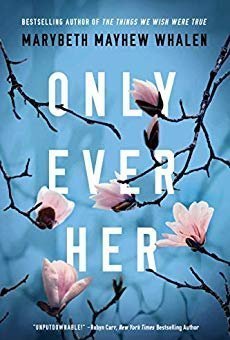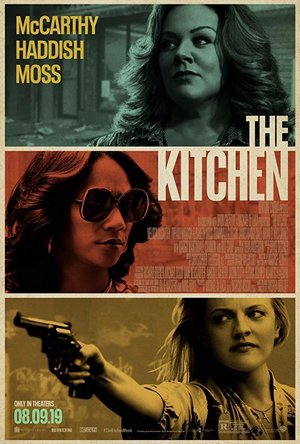Kristy H (1252 KP) rated Only Ever Her in Books
Jun 21, 2019
"Some people hear their mother's voices in their heads, but Annie hears her aunt's, the closest thing she has to a mother."
This book wasn't anything like what I was expecting, and honestly, it was a rather strange tale, but it was still rather interesting. It's a character-driven read, not a suspense novel, but wow, I got really attached to some of these characters. I picked this one up based solely on the strength of the last Marybeth Mayhew Whalen novel I read, WHEN WE WERE WORTHY. She has a real knack for capturing her characters: they jump off they page and stick with you. In particular, I fell hard for Faye and Clary in this one. And, of course, there was Annie, who was always there, motivating nearly every character:
"She has to make the town happy, like she always has. It is her act of service, her offering on behalf of the greater good. When you're the only survivor of the town's darkest moment, you do whatever you can to bring light."
There are a lot of narrators in the novel, but together they expertly show the web and ties of a small town, where it seems everyone has a secret of some sorts. I thought the beginning of the book was a bit slow, but it picked up in the second half, becoming rather dramatic and suspenseful. It's also an emotional read, as you become more and more invested in the characters. I expected more with Annie's storyline and disappearance--the ending sort of fizzled there for me. The more compelling piece is truly her mother's murder and its aftermath, especially on Faye.
Still, this was an interesting and poignant read featuring some excellent characters. While it was a bit slow to start, I found myself quite immersed in the second half. I really enjoy what Whalen can do with her small town personalities. 3.5 stars.

Contact Urticaria Syndrome
Ana M. Gimenez-Arnau and Howard I. Maibach
Book
Contact urticaria syndrome was first defined in 1975 and since then scientific interest has steadily...

Real Cricket™ 17
Games and Sports
App
Real Cricket™ is here and here to stay! We have migrated to a brand new experience with Real...
ClareR (6062 KP) rated The Lady of the Ravens in Books
Jan 7, 2020
Joan and her mother are taken in to the care of Margaret Beaufort, Henry VII’s mother, during the end years of the Wars of the Roses. She becomes a good friend to Princess Elizabeth in the time before she marries Henry, and goes on to be a Lady in Waiting and eventually the Lady Governess to the Princesses Margaret and Mary.
I really enjoyed all of the historical detail and what life was really like in Tudor England: the preoccupation with death and the many ways that a woman especially, could die, and the precariousness of children’s lives.
I had never really thought about the Ravens in the Tower of London (you’re never interested about the places that are on your doorstep as you’re growing up, I fear 🤷🏼♀️), assumed they’d always been there and that they’d always been seen as important to the realm. But in this novel, we learn that they were actually seen as vermin by the nobility and soldiers stationed there, until Joan and her servant looked after them, convincing others - royalty especially - of their significance to the safety of England and the Royal Family.
I haven’t read Joanna Hickson books before, but I really enjoyed the characters, the insights into the royal family, the uncertainty around the possible sons of York (Perkin Warbeck for one), the descriptions of everyday life - and just the evocative styled her writing.
Many thanks to NetGalley and HarperCollins for my copy of this great book to read and review.
Lenard (726 KP) rated The Kitchen (2019) in Movies
Sep 2, 2019
"The Kitchen" is based on a graphic novel series. Multiple story threads and divergent schemes are explored. The whole thing is much better suited for a miniseries or limited series than a feature film. Nowadays there is a cinematic quality to certain shows on pay channels so it wouldn't even lose the visual quality Andrea Berloff wants. This is the only problem with the film. The acting is top-notch, especially character actor Bill Camp. The writing is good. The story just needed a lot more space to grow. Ruby is an extremely complex character that would have benefited from character development inherent in a long-form series. A girl from Harlem who had the softness beaten out of her who has a long game which could have been explored in more depth especially considering the co-conspirators she acquires.
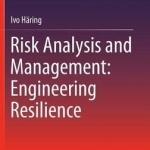
Risk Analysis and Management: Engineering Resilience: 2015
Book
The book introduces basic risk concepts and then goes on to discuss risk management and analysis...
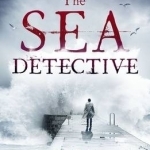
The Sea Detective
Book
The first mystery in a truly unique crime series. 'There comes a time when a novel raises the bar...
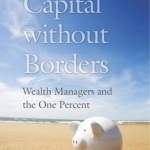
Capital Without Borders: Wealth Managers and the One Percent
Book
How do the one percent hold on to their wealth? And how do they keep getting richer, despite...
Jesters_folly (230 KP) rated Mr Harrigan's Phone (2022) in Movies
Oct 10, 2022
Mr Harringan's phone follows Craig, a young boy who is hired by the reclusive Mr Harringan. After working for him for a few years Mr Harringan dies. During his period of grief Craig phones Mr Harringan's old phone and tells him about the problems he is having with a bully, the bully dies soon after and Craig is sure the dead Mr Harringan has something to do with it.
Mr Harringan's phone has the potential to be a great ghost film but it doesn't manage to pull it off. The first 40 to 50 minutes of the film builds up the relationship between Craig and Mr Harringan leaving around an hour for the spooky stuff. However there is little actual horror, there are only 2 deaths due to the ghost and you don't see either of them. The film give what could be natural reasons for the deaths and tries to focuse on the effect they have on Craig as he thinks that he caused them but even this seems lacking.
The film feels like it's trying to be a 'classic' set in the modern day, like a Charles Dickens novel set in the naughties and it does pull this off but still seems to be lacking something.
If you are looking for something like the ring then this probably isn't for you but if you want a slow burn in the gothic/Dickens vain then it may be worth a watch.
Kyera (8 KP) rated Princess of Thorns in Books
Feb 1, 2018
The author makes use of these characters and plots in her novel. She chooses to include the ill-fated mother, brother and sister, as well as the villainous step-mother. Although that familial tie is not explicitly stated, the King was the children's father and he married the ogre. Thus, she would be their step-mother. And you thought you had a dysfunctional family?
In true fairytale fashion, there are ogres, witches, fairies, and ruffians. Not all are portrayed as you would expect. The ogres have evolved, or perhaps devolved depending upon who you ask. In the early years, the ogres were monstrous creatures that devoured souls whole. They did not control themselves, but feasted on the entire soul leaving nothing behind. As time went on, they were forced to change and limit how much they took. After a time, the ogres began to become smaller and take on much more human-like appearances. Their food source never changed and they prided themselves upon each soul they took, marking their bare skulls.
The Fae seem human, although they possess extra-human traits and magic. One may not think of fairies and immediately imagine a human-like creature with great dexterity, skill in battle, and a lack of guilt -but the Fair Folk are shown this way in the novel. A fairy can bestow a gift upon a human child, like beauty, courage, eloquence, obedience, or strength. But each blessing comes with a curse, as the magic always finds a way to turn the gift into a burden. There are untold consequences to the blessings that cannot be avoided. As such, the fairies stopped giving their gifts to human children.
As with most fairytales, there is an element of romance. The love story blossoms under unusual circumstances and not without its share of problems. The two characters get to know each other throughout the journey, but their are many secrets left untold. As they are discovered, the relationship is altered for good or bad. And in the end, a choice must be made.
Most importantly, the novel isn't entirely predictable (although the budding romance was expected). Generally, you expect good to triumph over evil in most modern retellings of the story - unlike their Grimm counterparts. The plot's climax was frankly a little anti-climactic, but enjoyable non-the-less.
I think the author showed an average amount of character development, although I usually think more would be incredibly beneficial. Certain aspects of the world were explained, but not vividly enough. The "show-don't-tell" method could have been employed here to create a richer, more immersive world. Overall, I was pleased with the author's lexicon, grammar, and spelling - which happens much less often than should reasonably be expected.
I would certainly read another novel by this author as I love stories based upon fairytales. If you read Alex Flinn, I would highly recommend this novel to you just keep in mind it is slightly darker. Readers of fantasy, romance, and the like will enjoy this book and should give it a chance. It seems to target the female demographic, but males should enjoy it as well.
